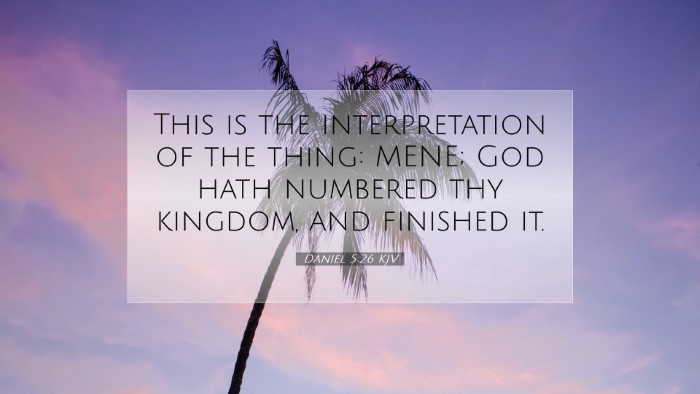Commentary on Daniel 5:26
Daniel 5:26, which states, "This is the interpretation of the matter: MENE, MENE, TEKEL, and PARSIN.", serves as a significant moment in the narrative of Babylonian history and in the broader context of biblical prophecy. This verse encapsulates God's judgment against King Belshazzar and offers profound lessons on divine sovereignty, accountability, and the fate of nations.
Contextual Background
The events leading up to Daniel 5:26 occur during a feast hosted by Belshazzar, during which he profanes the sacred vessels from Solomon's temple. This brazen act of idolatry prompts God to send a mysterious hand that writes on the wall, leading to a sense of dread among the king and his guests. Daniel’s eventual interpretation not only reveals the immediate consequences for Belshazzar but also lays bare the spiritual truths that resonate across centuries.
Divine Sovereignty
Commentators like Matthew Henry emphasize the sovereignty of God, as demonstrated in this narrative. The phrase "MENE, MENE, TEKEL, PERES" is an effective proclamation of divine will, underscoring that God is not absent in human affairs. Belshazzar's rule is under scrutiny, and his actions are no longer tolerated. The repetition of "MENE" suggests something of great significance, indicating that the matter is confirmed and emphasizes its urgency.
God's Judgment
According to Albert Barnes, the use of these terms conveys judgment distinct to each aspect of Belshazzar's reign. "MENE" signifies that God has numbered Belshazzar's days and brought them to an end; "TEKEL" indicates that he has been weighed in the balance and found wanting; and "PERES" proclaims that his kingdom will be divided and given to the Medes and Persians. These judgments serve as stern reminders that earthly power is transient and subject to divine regulation.
Spiritual Insight
Adam Clarke also provides insight into how this passage relates to spiritual accountability. The writing on the wall highlights that God not only observes human behavior but measures individuals and nations against His standards of righteousness. It actuates the universal principle that God calls all to account. The clear demarcation in the interpretation suggests that moral uprightness is fundamental, and when leaders fail to uphold it, severe consequences ensue.
The Use of Weights and Measures
The phrase "TEKEL" resonated during this scene, particularly in a society that relied heavily on weights for trade. Commentators like Matthew Henry highlight how this term symbolizes moral and ethical evaluation. Belshazzar's transgressions and indulgences showcase a ruler devoid of integrity, thus marking him unfit for leadership. The meticulous nature of divine judgment through a familiar economic metaphor makes the reality of judgment strikingly relatable.
Lessons for Today
- Accountability Before God: This narrative brings forth the reality that leaders must be accountable to the higher authority of God. It serves as a reminder for those in positions of power that their actions have consequences.
- Transience of Earthly Power: Similar to Belshazzar's contradiction of divine order, modern governments and institutions are also subject to God's ultimate jurisdiction over the affairs of men.
- Call to Righteousness: The interpretation insists on a moral evaluation of one's life and decisions. Individuals and corporate entities are encouraged to seek alignment with divine principles to avoid dire judgments.
Conclusion
Daniel 5:26 reminds us that God's will prevails and, ultimately, His judgment is not something to be taken lightly. The ancient language of MENE, TEKEL, and PERES transcends time, offering a harrowing reminder of accountability and ethical behavior, challenges that are as relevant today as they were in Babylon. This passage finds its power in the stark realization that God actively engages with the world, measuring not just the actions but the very heart of individuals and nations alike.
As pastors, students, theologians, and scholars explore this text, it is crucial to consider the deep implications it holds concerning divine justice, morality, and the inevitability of accountability. Through the lens of the wall's writing, we recognize the ever-present need to reflect on our actions and to uphold righteousness in every sphere of influence.


